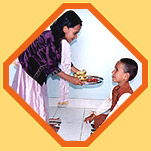Regional Significance
 |
| BHAI DOOJ |
There are various distinct ways in which this beautiful festival is solemnized. But the features that are common in all rituals is the act of smearing a tilak of roli (vermilion), kesar (saffron) and rice on the brother's forehead by their sister as a mark of their love and protection.
Uttar Pradesh
In Uttar Pradesh, the brother is gifted with an `aabf- a length of flax, knotted into a circular shape and dotted with sugar batashas. There are two aabs for each brother. After performing all the rituals that include the sister applying a tilak of roli and rice on her brother's forehead and praying him with an aarti to shed off all the evil effects, the story of Bhai Dooj is narrated.
Punjab
In Punjab, the day following Diwali is known as tikka when sisters make a paste with saffron and rice and place an auspicious mark on their brother's foreheads as a symbolic gesture to ward off all harm.
Bengal
In Bengal this event is called 'Bhai Phota', which is performed by the sister who religiously fasts until she applies a 'phota' or mark with sandal wood paste on her brother's forehead, offers him sweets and gifts and prays for his long and healthy life. Diyas and incense sticks are an integral part of the ceremony. An aarti is also performed.
Bihar
In Bihar, sisters repeat the behavior of the central character of the story of Bhai Dooj, where a sister saves her brother life by cursing him until he gets married. The curse is seen as a mean to ward off all the dangers and evil effects of the spirits surrounding the brother. The sisters of Bihar start this day by showering choicest of curses on their brothers. After doing so, they prick their own tongues as punishment, with a thorny, wild fruit and ask for their brothers' forgiveness for the curses, and also for past mistakes. There is also a unique custom of brother eating grains of bajri with water, from their sisters' hands.
Bhai Dooj